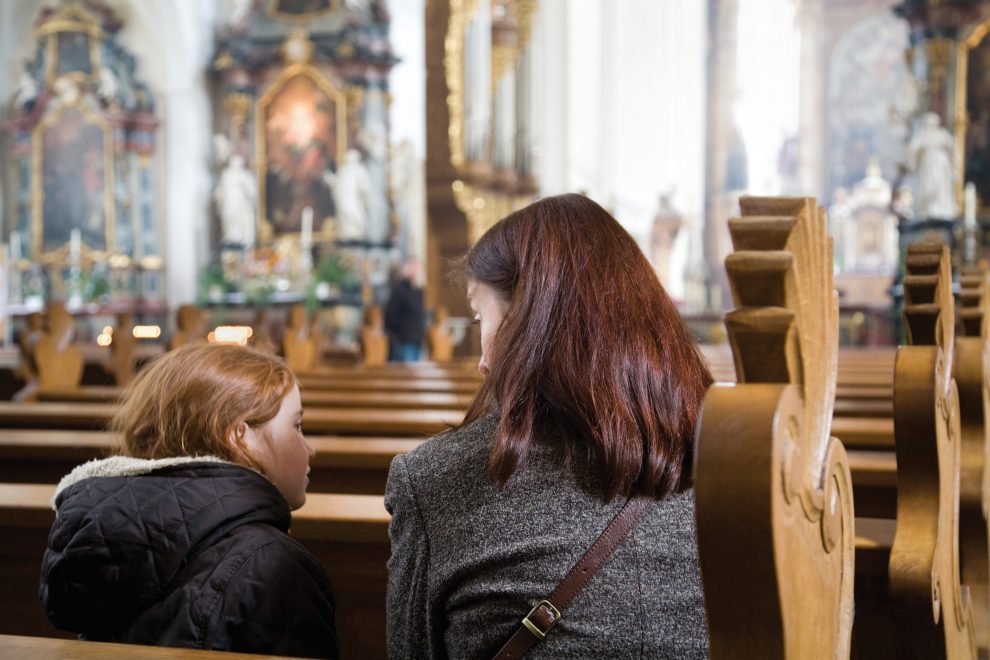Our faith is built upon the backs of many women. Mothers like Eve, Sarah, and Rachel taught us long before Mary’s remarkable fiat. Deborah and Esther, strong women in the Hebrew Bible, give us courage and confidence in the gifts God has bestowed upon us. More modern female apostles like Mary of Bethany and Martha show us how important female support is to the church. And Mary Magdalene, loyal to Jesus in life and after death, was the first person Jesus appeared to after his resurrection—igniting the role of women in the church.
Even with all of these women to guide me in my faith, I still question how I can remain a part of a religious institution that has denied women so much. How can I expect my daughters and sons to have a healthy understanding of gender equality when the religion I am raising them in does not adhere to societal standards? Is this really what God intended for creation?
Although I know where my own heart is anchored on many matters, the waters muddy pretty quickly when you try to explain things to a curious 5-year-old.
The Catholic Church has long been full of changemakers, and raising Catholic feminists is an important part of that story now more than ever. I love many things about this faith, and I looked forward to raising children within the Catholic community. But parenting young Catholics is a struggle filled with contradictions. As an adult, I have become conditioned to these realities.
Although I know where my own heart is anchored on many matters, the waters muddy pretty quickly when you try to explain things to a curious 5-year-old. Questions such as “Why aren’t there girl priests?” or “Is it OK for someone to have two moms?” make me wonder where my faith and my real life actually intersect. I wouldn’t say I am complicit for post-Mass coffee and doughnuts alone, but I could study doctrine and dogma all day long, and it would still be the community that keeps me here.
I don’t want to raise sheep that will blindly follow.
That’s because we are a people of faith—and I want all of my children to have a seat at that table. I want them to be able to question their faith and find their own why when it is time for their confirmation. I want them to become changemakers if they are called to be. I don’t want to raise sheep that will blindly follow. I want them to know the reasons and history behind current traditions such as the male-dominated hierarchy and impositions such as marriage only being acceptable between a man and a woman. Change might seem improbable, but I want them to know that it is possible and encourage them to notice the little steps that might be moving the needle.
During the last Mass we attended before shelter-in-place was enforced this past spring, the deacon at our parish gave a thoughtful homily only to announce at the end that a high school senior in the parish—a young woman—had written it.
At first, I wished he hadn’t waited to announce such an important detail until after the fact. Later, I realized how strategic it was that the deacon did not tell us who had written the homily first. No one was able to form a presumptive opinion. I also realized that this was a step. I think it was actually a pretty big step. This is what I have been hoping for. Hearing the words of a young woman at Mass opened the door to a conversation with my own daughter and hopefully did the same for many other daughters and sons in our parish.
We as parents are our children’s first teachers, and I have been routinely reminded of that during our time at home this year. We had guidance from school, did lots of e-learning, and could even livestream Mass, but most of our children’s education was up to us for the first time ever. Becoming a sudden home-schooling mom helped me see the effects that encouragement and discouragement have on how our children learn and absorb what we are teaching.
Our faith institution is a work in progress, but our individual faith is perfect in God’s eyes, and God is with us through the progression.
During the quarantine, I realized that I couldn’t expect my children to get a gainful faith experience through their school lessons alone. We need to be diligent about these foundations at home so that when they have questions they know where to turn.
I cannot witness inequality in the church and teach my children how to deal with it by blindly going through the motions, hopeful that they someday have a healthy grasp of the situation merely by chance. I do not pretend to have all (or any) of the answers for them. What I can offer are honesty and compassion and a better understanding about historical context. I can offer them conversations about my own feelings and be empathetic toward theirs.
Our faith institution is a work in progress, but our individual faith is perfect in God’s eyes, and God is with us through the progression. God calls us not to question our love and devotion to God, but sometimes to question our route in getting there. If we as Catholics are called to be part of a faith that claims to be rooted in the teachings of Jesus, then we need to accept that part of this calling is to be a part of the change.
This article also appears in the October issue of U.S. Catholic (Vol. 85, No. 10, pages 43-44). Click here to subscribe to the magazine.
Image: iStock.com/FrankyDeMeyer














Add comment